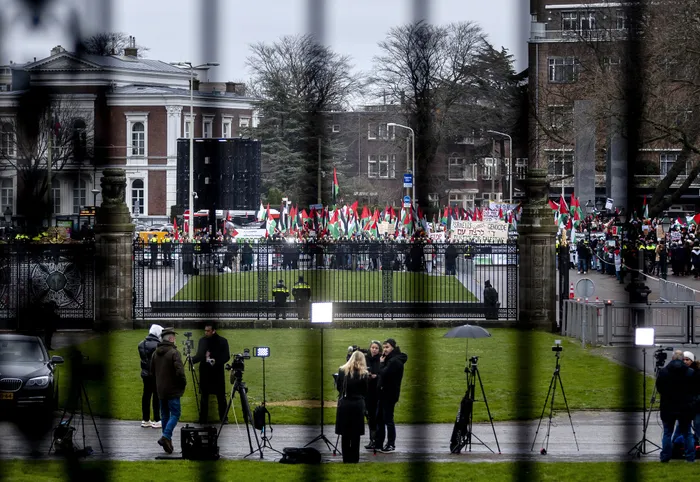Africa’s deafening silence on human rights

Picture: Remko De Waal / ANP MAG / ANP via AFP / Taken on January 12, 2024 – The Hague. A pro-Palestinian demonstration seen from the Peace Palace during the International Court of Justice (ICJ) hearing of the genocide case against Israel brought by South Africa. According to the South Africans, Israel is currently committing genocidal acts against Palestinians in the Gaza Strip.
By Sizo Nkala
On December 29, South Africa filed a case at the International Court of Justice (ICJ), accusing Israel of committing genocide in its invasion of the Palestinian territory in the Gaza Strip.
Israel launched a military operation in the territory following the October 7 Hamas attack on Israel which led to the killing of 1,300 civilians and the capture of 240 hostages.
To date, Israel’s forces have killed more than 23,000 Palestinians with many of the victims being women and children and displaced hundreds of thousands more.
While some parties have accused Israel of inflicting collective punishment against Palestinians, Israel’s leaders have argued that their attacks are targeted at Hamas agents and not civilians.
However, South Africa, which has been fiercely critical of Israel’s operation in Gaza, remains unconvinced and has filed a case against the Jewish state at the ICJ.
In its papers, South Africa argues that Israel’s conduct in Gaza is “genocidal in character because they are intended to bring about the destruction of a substantial part of the Palestinian national, racial and ethnic group”.
South Africa insists that killing huge numbers of children (an estimated 10,000 Palestinian children have been killed), the massive destruction of homes and displacement of 85 percent of the population in Gaza, the blockade on food and the bombing of health infrastructure, and the characterisation of Palestinians as sub-human in statements attributed to the Israeli leadership all indicate a genocidal intent by Israel.
Unsurprisingly, Israel has rejected South Africa’s claims as baseless and unfounded. Flipping the claims, Israel insists that its people are the victims of genocidal actions by the Hamas group.
The first part of the case was heard on Thursday and Friday by a panel of 15 judges in the ICJ chambers at the Hague in The Netherlands.
The judges listened to South Africa’s submission for an injunction ordering Israel to stop its military operation in Gaza and Israel’s rebuttal of the request.
It is believed that a ruling will probably be issued within a few weeks, as happened last year when the ICJ ruled that Russia should stop its invasion of Ukraine in fewer than three weeks following a case brought by Ukraine.
Depressingly, just like how Russia ignored the court’s ruling and continued with its operations in Ukraine, there is no indication that Israel will stop its operation should it be ordered to do so. Unlike national courts, the rulings of the ICJ are binding but not enforceable.
However, determining whether Israel’s actions in Gaza constitute genocide will take years. The ICJ is considering a case brought by the Gambia against Myanmar in 2019 in which the Gambia accused Myanmar of committing genocide in its military attacks on Rohingya refugees.
South Africa’s case against Israel has divided opinion, revealing the geopolitical contours that underpin global politics today.
Its case has received support from the 57-member Organisation for Islamic Co-operation whose members include Saudi Arabia, Iran and Turkey. The 22-member Arab League and individual countries such as Namibia, Malaysia, Bolivia, Jordan, Turkey, and the Maldives have all voiced their support for South Africa’s application to the ICJ.
On the other hand, countries like the US and the UK have dismissed South Africa’s case.
White House National Security Council spokesperson John Kirby described the case as “meritless, counterproductive and completely without any basis in fact whatsoever”.
Referring to the South African case, UK Foreign Secretary David Cameron was quoted as saying: “I don't think that is helpful, I don't agree with it, I don't think it's right.”
The pronouncements from the UK and the US are perhaps not surprising as they have staunchly supported Israel’s actions in Gaza, insisting that the country has a right to defend itself.
However, Africa has been conspicuous by its silence on the case. Only Namibia has come out in support of South Africa’s case whereas other countries are mum. Neither the AU nor any of the regional bodies has issued a statement on the case.
One wonders if South Africa either consulted or notified its African counterparts about its intentions to take Israel to the ICJ.
Nonetheless, the reticence is perhaps not surprising considering that African states have failed to speak with one voice on the Israel-Palestine conflict, with some like Ghana, Kenya and Rwanda supporting Israel while South Africa, Zimbabwe and Algeria, among others, have come out in support of Palestine.
However, it is only South Africa that has gone so far as to label the events taking place in Gaza a genocide. Africa’s silence is harmful to and undermines the continent’s geopolitical position, especially in the context of promoting South-South co-operation.
The Global North has clearly thrown its weight behind Israel in speech and through massive amounts of aid.
The Global South has not shown the same commitment to the Palestinian cause.
While the countries of the Global South do not have the West’s resources at their disposal, showing active solidarity with Palestine in critical moments like the ICJ case that could prove to be a turning point is crucial.
This is not the time for Africa to be reticent. It must use its voice, no matter how feeble, to call for justice for the people of Palestine.
Dr Sizo Nkala is a Research Fellow at the University of Johannesburg’s Centre for Africa-China Studies